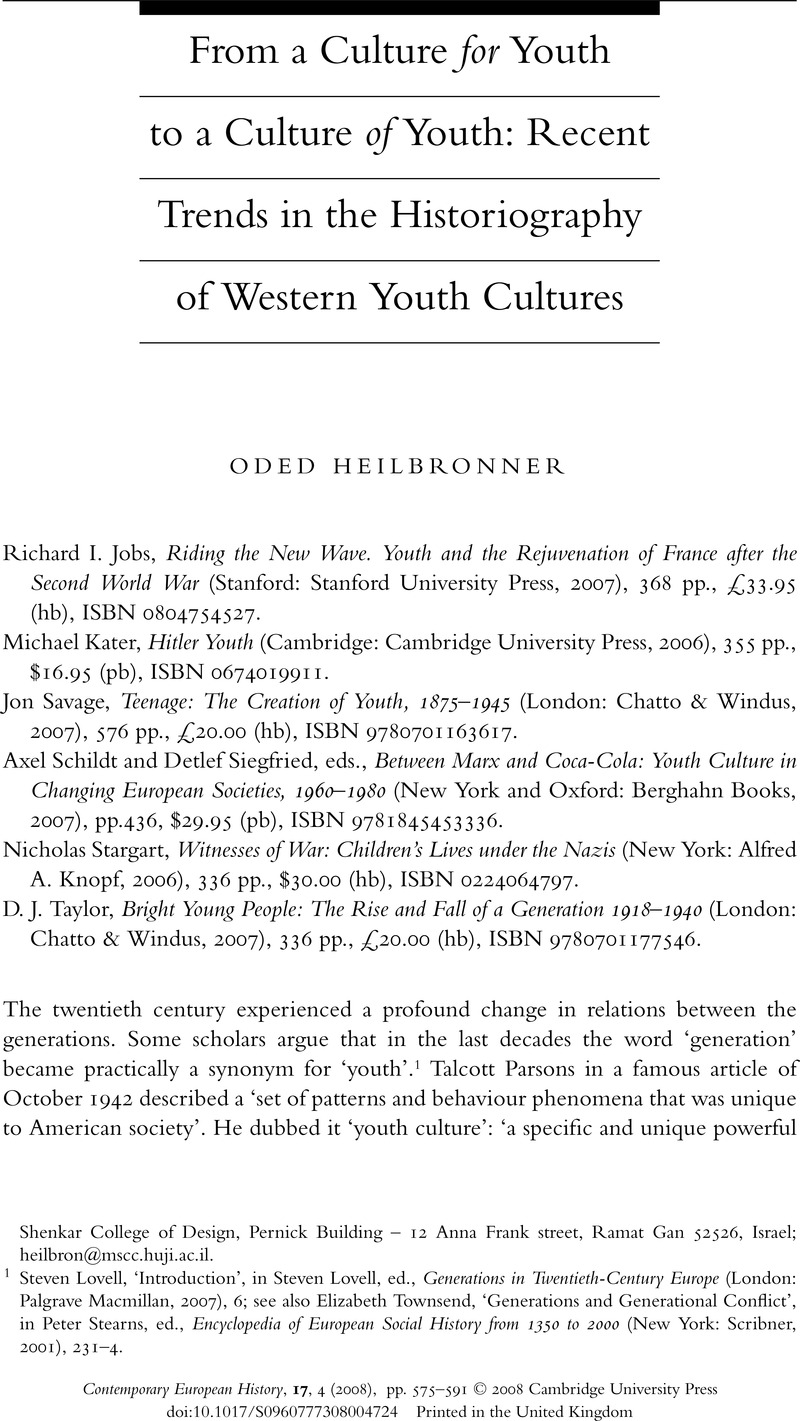Published online by Cambridge University Press: 01 November 2008

1 Lovell, Steven, ‘Introduction’, in Lovell, Steven, ed., Generations in Twentieth-Century Europe (London: Palgrave Macmillan, 2007), 6Google Scholar; see also Townsend, Elizabeth, ‘Generations and Generational Conflict’, in Stearns, Peter, ed., Encyclopedia of European Social History from 1350 to 2000 (New York: Scribner, 2001), 231–4Google Scholar.
2 Parsons, Talcott, ‘Age and Sex in the Social Structure of the United States’, American Sociological Review, 16 (October 1942), 604–16CrossRefGoogle Scholar.
3 Hall, Stuart and Jefferson, Tony, eds., Resistance Through Rituals: Youth Subcultures in Post-war Britain (London: Routledge, 1979)Google Scholar.
4 Mannheim, Karl, ‘Das Problem der Generation’, in Karl Mannheim: Wissenssoziologie. Auswahl aus dem Werk, ed. Wolff, Kurt H. (Neuwied: Luchterhand 1964)Google Scholar.
5 See Wohl, Robert, The Generation of 1914 (London: Routledge, 1980)Google Scholar.
6 Hebidge, Dick, Subculture: The Meaning of Style (London: Routledge, 1987), 56–7Google Scholar.
7 Williams, Raymond, Keywords: A Vocabulary of Culture and Society, 2nd edn (Harmondsworth: Penguin, 1983)Google Scholar.
8 Whaley, Joachim, ‘The Ideal of Youth in late 18th-Century Germany’, in Roseman, Mark, ed., Generations in Conflict: Youth Revolt and Generation Formation in Germany 1770–1968 (Cambridge: Cambridge University Press, 1995), 47–67CrossRefGoogle Scholar.
9 Fowler, David, The First Teenagers: The Lifestyle of Young Wage-Earners in Interwar Britain (London: Woburn Press, 1995)Google Scholar.
10 For young Germans’ dating and infatuation with GIs see Höhn, Maria, GIs and Fräuleins: The German–American Encounter in 1950s West Germany (Chapel Hill: University of North Carolina Press, 2002), 80–2, 164–8Google Scholar.
11 On this topic see Biess, Frank, Homecomings: Returning POWs and the Legacies of Defeat in Postwar Germany (Princeton: Princeton University Press, 2006)Google Scholar.
12 Quoted in Eley, Geoff, ‘What Produces Democracy? Revolutionary Crises, Popular Politics and Democratic Gains in 20th-Century Europe’, in Haynes, Mike and Wolfreys, Jim, eds., History and Revolution: Refuting Revisionism (London: Verso, 2007), 172–201, here 194.Google Scholar
13 Hobsbawm, Eric, The Age of Extremes: The Short Twentieth Century 1914–1991 (Harmondsworth: Penguin, 1994), 324–7Google Scholar.
14 Ibid., 325.
15 Ibid., 327.
16 ‘You never had it so good’, declared Harold Macmillan, the British prime minister, in 1957. See Sandbrook, Dominic, Never Had It So Good: History of Britain, 1945–1963 (London: Little, Brown, 2005)Google Scholar.
17 This development had already been shown by the underground youth group the Edelweisspiraten.
18 Hebidge, Subculture, 56–7.
19 Ross, Kristin, Fast Cars, Clean Bodies: Decolonization and the Reordering of French Culture (Cambridge, MA: MIT Press, 2006)Google Scholar, discussed these issues recently.
20 Ibid., 158.
21 Nora, Pierre, ‘Generation’, in Nora, Pierre, ed., Realms of Memory: Rethinking the French Past, vol. 1 (New York: Knopf, 1996), 503Google Scholar.
22 The book's title is taken from that of Jean-Luc Godard's 1967 film Masculin-Feminin (The Children of Marx and Coca-Cola), and it originated from a conference held in Copenhagen in 2002.